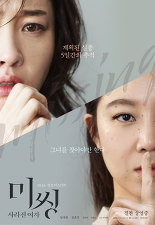Lost, Found
找到你
China, 2018, colour, 2.35:1, 101 mins.
Director: Lv Yue 吕乐.
Rating: 8/10.
Powerful child-kidnap drama is a fine showcase for Mainland actresses Yao Chen and Ma Yili.
Haiying city, China, early Sep 2017. Li Jie (Yao Chen) is an ambitious prosecuting lawyer with a two-year-old daughter, Duoduo (Yu Zhenhui), whom her ex-husband, hospital doctor Tian Ning (Yuan Wenkang), is fighting for custody of. Duoduo has been kidnapped and Li Jie has been given a location in an underpass to collect her after paying RMB280,000 ransom. After failing to find Duoduo, Li Jie reports the case to the police, convinced that the child’s nanny, Sun Fang (Ma Yili), kidnapped her. However, Li Jie’s hostile mother-in-law thinks Li Jie herself conspired with the nanny in a plan to retain Duoduo in the custody battle; even Li Jie’s assistant, Xiaojiang (Yuan Jing), is suspicious of Li Jie’s story. (One day earlier, as Li Jie had been leaving for work, Sun Fang had wanted to talk to her about something but Li Jie had brushed her off. In court Li Jie had ruthlessly demolished Zhu Min, a mother [Tao Xinran] who was suing for custody of her child, and later met Tian Ning, refusing to budge on retaining custody of Duoduo. In the evening she drank heavily at a business dinner, and only discovered Duoduo and Sun Fang were missing when she returned home. Checking the apartment building’s CCTV, she discovered that Sun Fang had left with Duoduo that morning and never returned. Meanwhile, Xiaojiang reported that Zhu Min had tried to commit suicide. Li Jie visited Mrs. Liu, the neighbour who recommended Sun Fang, and found Sun Fang was only a migrant worker, not actually her niece. She next went to the police, but halfway through reporting Duoduo’s disappearance she was phoned by a man demanding a ransom. After transferring the money by phone, she was given a location to collect Duoduo.) Back at her flat, Li Jie examines old CCTV footage in more detail and sees Sun Fang behaving strangely outside the building back in late June. She traces a friend of Sun Fang via a parcel receipt – roommate Lin Xiaolu (Gao Ye), who says Sun Fang moved out three months ago when she got the job as Duoduo’s nanny. Sun Fang had been heavily in debt and fallen for a petty criminal, Zhang Bo (Wu Haochen). Lin Xiaolu takes Li Jie to Xu Lan (Qi Xiang), a fellow villager of Sun Fang, who fills Li Jie in on Sun Fang’s past history – which includes marrying an abusive husband (Wang Zichen) and discovering their baby daughter has a rare liver complaint.
REVIEW
Two fine Mainland actresses – Yao Chen 姚晨, who doesn’t do enough serious leading roles, and Ma Yili 马伊琍, who doesn’t do enough big-screen movies – go head-to-head in Lost, Found 找到你, a powerful drama about a yuppie mother, her kidnapped child and the kid’s nanny. It’s the first feature in over a decade by Lv Yue 吕乐, 61, a d.p. who’s worked with the likes of Feng Xiaogang 冯小刚, Wu Yusen 吴宇森 [John Woo] and Zhang Yimou 张艺谋, occasionally turning his hand to directing in unpredictable styles (the elliptical Mr. Zhao 赵先生, 1998, the gentle The Foliage 美人草, 2004, the semi-realistic Thirteen Princess Trees 十三棵泡桐, 2006). Backed by three heavyweight Mainland companies, Lost, Found has a big feel despite its intimate subject, with a mature cast on top form, experienced key crew, and a complexly constructed script that does finally deliver a lump in the throat. Local box office was a solid RMB285 million, okay for a human drama with no splashy action, visual effects or youth-bait cast.
 If the plot bears striking similarities to the South Korean film Missing 미씽 사라진여자, directed by Yi Eon-heui 이언희 | 李彦禧 and released in Nov 2016 (see poster, left), that’s because, like Miss Granny 重返20岁 (2015), the same story was separately developed for different markets, with the South Korean version coming out first. Like Miss Granny, it’s not a remake of an existing film; rather, says scriptwriter Qin Haiyan 秦海燕, the two films are separate takes on the same story (一本两拍). In early 2016 producer Chen Jie 陈洁 bought the rights to the original story of Missing (by first-timer Hong Eun-mi 홍은미) when its script was still in a rudimentary state and filming had not yet begun. When the South Korean version went into production, Qin started work on her Chinese version of the story, reworking the material from a Mainland Chinese perspective.
If the plot bears striking similarities to the South Korean film Missing 미씽 사라진여자, directed by Yi Eon-heui 이언희 | 李彦禧 and released in Nov 2016 (see poster, left), that’s because, like Miss Granny 重返20岁 (2015), the same story was separately developed for different markets, with the South Korean version coming out first. Like Miss Granny, it’s not a remake of an existing film; rather, says scriptwriter Qin Haiyan 秦海燕, the two films are separate takes on the same story (一本两拍). In early 2016 producer Chen Jie 陈洁 bought the rights to the original story of Missing (by first-timer Hong Eun-mi 홍은미) when its script was still in a rudimentary state and filming had not yet begun. When the South Korean version went into production, Qin started work on her Chinese version of the story, reworking the material from a Mainland Chinese perspective.
Though the plotting is very similar, especially in the early and later stages, the two main characters are entirely different in personality. In the Korean version, the mother (well played by Eom Ji-weon 엄지원 | 严志媛) is a chaotically organised, middle-class PR, while the nanny (rather unconvincingly played by Gong Hyo-jin 공효진 | 孔晓振) is a Chinese woman with a poor grasp of Korean – which adds a whole new racial angle. In the Chinese version, the mother (Yao) is a cool, big-city yuppie lawyer, while the nanny (Ma) is an uneducated migrant worker from the countryside. More importantly, the two movies have very different feels, not only in atmosphere and direction – with each strongly rooted in its own society – but also structurally, with Lost, Found adopting a non-linear structure that continually flashbacks to explain how events came about.
Overall, Lost, Found has a bigger feel – especially thanks to the widescreen photography by Cheng Ma Zhiyuan 程马志远, that recalls his richly textured work on The One 绝世高手2017 (2017) – and is much stronger dramatically, anchored by two equally strong actresses rather than just one. (South Korean director Yi has kind of been here before: her rather routine light drama …ing …ing [2003] was extensively reworked into the far better Mainland production First Time 第一次 [2012].) Lost, Found‘s off-screen talent is also stronger, from director Lv, via veteran Feng as creative producer 监制, to writer Qin (A Wedding Invitation 分手合约, 2013, plus several films for director Zhang Ming 章明), composer An Wei 安巍 (whose parallel experience in sound design creates some creepy moments) and editor Zhang Yifan 张一帆. Its only major flaw is an over-doctrinaire coda that strains credulity and would have best been omitted.
Though it’s not a crime drama per se, the film extracts the maximum physical drama out of the story, starting with Yao’s lawyer running in desperation through an underpass to try to find her young daughter and then flashbacking a day earlier to show her as a neat, ambitious lawyer coolly destroying an emotional mother who’s trying to gain custody of her child. It then emerges that she’s also coolly fighting off her own ex-husband to retain custody of her child and, only after a boozy business dinner with a client, finally returns home to find the daughter (and nanny) missing.
The first half largely focuses on the lawyer trying to solve the mystery, with a mixture of professional cool and personal emotion; the second half reveals how the abduction came about and for what reasons, as well as progressing the search for the missing child by the police. Ma’s nanny comes into her own here, with a detailed back story that partly balances the books and makes her more than just a simple villainess. It’s to the credit of both actresses that the moral lines become blurred between the two: in her most substantial dramatic role since Caught in the Web 搜索 (2012), Yao, 39, is totally believable as the ambitious, yuppie lawyer who’s under-invested in motherhood, while Ma, 42, almost unrecognisable in plain clothes and long hair, subtly underplays the nanny in a performance that goes for the long burn alongside Yao’s more on-the-nose playing. They’re genuinely complementary performances that you can’t slide a cigarette paper between in terms of quality.
Supporting roles are also strong, especially on the female side, from Gao Ye 高叶 as a sassy roommate of the nanny to Qi Xiang 齐襄 as a fellow villager and Tao Xinran 陶昕然 as the court-case mother, all TV actresses. Male roles are less dramatically shaded – with the lawyer’s husband blandly written and weakly played – but TV actor Wu Haochen 吴昊宸, in his big-screen debut, has moments of empathy as a hustler friend of the nanny. The film’s Chinese title literally means “Find You”.
CREDITS
Presented by Huayi Brothers Pictures (CN), Shanghai Film Group (CN), Wanda Media (CN), Bad Rabbit Pictures (CN), Easy Production (CN).
Script: Qin Haiyan. Photography: Cheng Ma Zhiyuan. Editing: Zhang Yifan. Music: An Wei. Art direction: Li Yanwai. Sound: Wen Bo.
Cast: Yao Chen (Li Jie), Ma Yili (Sun Fang), Yuan Wenkang (Tian Ning), Wu Haochen (Zhang Bo), Wang Zichen (Hong Jiabao), Gao Ye (Lin Xiaolu), Qi Xiang (Xu Lan), Tao Xinran (Zhu Min), Yuan Jing (Xiaojiang), Yu Zhenhui (Duoduo), Ju Bozhan (Liu Shaoyun, police detective).
Premiere: Shanghai Film Festival (Competition), 17 Jun 2018.
Release: China, 5 Oct 2018.
